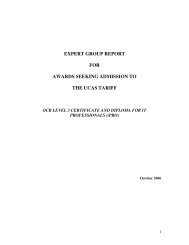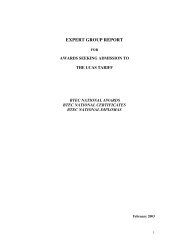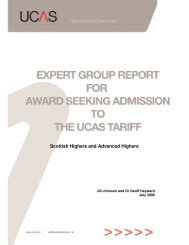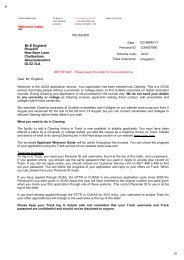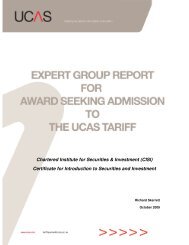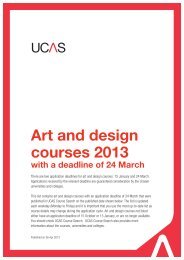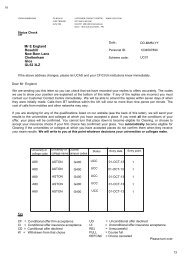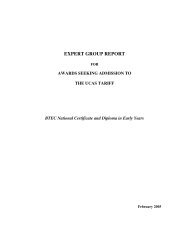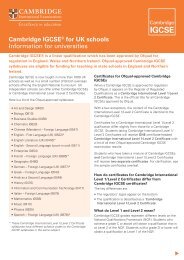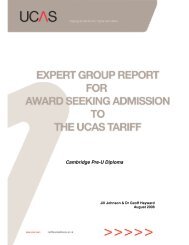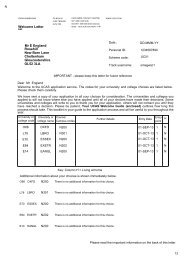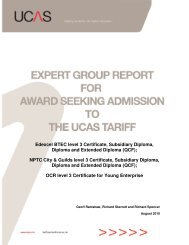International qualifications 2013 (pdf) - CUKAS
International qualifications 2013 (pdf) - CUKAS
International qualifications 2013 (pdf) - CUKAS
Create successful ePaper yourself
Turn your PDF publications into a flip-book with our unique Google optimized e-Paper software.
Qualifications currently offered<br />
GRADING SYSTEM<br />
5 Excellent<br />
4 Very good<br />
3 Good<br />
2 Sufficient<br />
1 Fail<br />
EDUCATION SYSTEM<br />
Nine years of primary education (starting at age six), with a<br />
foreign language introduced in year one, are usually followed by<br />
one of the following:<br />
g<br />
g<br />
g<br />
g<br />
Four-year grammar schools (gimnazija), which may be<br />
classified as general, linguistic, classical or scientific, with<br />
appropriately different curricula.<br />
Four-year art schools (art and design, music, dance).<br />
Four-year vocational schools (engineering, healthcare,<br />
economics, agriculture, etc).<br />
Three-year vocational schools (industrial, crafts, etc).<br />
Apart from IB programmes, where the language of instruction is<br />
English, the language of instruction in all other schools is<br />
Macedonian.<br />
ACCESS TO HIGHER EDUCATION<br />
Admission to HE in Macedonia is on the basis of the Secondary<br />
School Leaving Matura exam. The Republic of Macedonia<br />
became a member of the Bologna Process in 2003, having<br />
started with the changes in the higher education system much<br />
earlier in 2000 when the Ministry of Education and Science<br />
passed the new Law on Higher Education. The Law requires<br />
universities to start introducing the ECTS and designing study and<br />
subject programmes according to the principles of the Bologna<br />
Process.<br />
The existing academic degree granted with a diploma was<br />
transformed into a baccalaureus and the programmes were<br />
shortened from four years to around three. The degree granted<br />
with a magisterium is transformed into a master's degree,<br />
achieved after five years of study. Medicine and medicine related<br />
studies still last six or five years. The degree of doktorat (PhD,<br />
dr.sc.) remains but it can be received after three more years, i.e.<br />
eight years in total: three years (bachelor’s or baccalaureus) +<br />
two years (master’s) + three years (doctor of science or doktor na<br />
nauki).<br />
Malawi<br />
EVALUATION<br />
Malawi Junior Certificate Examination (JCE)<br />
Considered to be below GCSE standard.<br />
Malawi School Certificate of Education (MSCE)<br />
Acceptable at grades 1–6 in lieu of GCSE (grades A, B, C) on a<br />
subject for subject basis. Would need to be supplemented by GCE<br />
A levels, Scottish Highers or Advanced Highers, or a bridging course.<br />
GRADING SYSTEM<br />
Mark Grade Comments<br />
1 – 2 A Distinction<br />
3 – 4 B Credit<br />
5 – 6 C Credit<br />
7 D Ordinary Pass<br />
8 E Ordinary Pass<br />
9 F Fail<br />
EDUCATION SYSTEM<br />
Education is not compulsory in Malawi. Primary education starts<br />
at age six and lasts for eight years, during which the media of<br />
instruction are Chichewa and English. It culminates in the Primary<br />
School Leaving Certificate. Malawi introduced free primary<br />
education, which makes primary education mandatory, though<br />
there is no law that enforces this.<br />
Secondary education takes four years, the first two years of<br />
which are spent preparing for the Malawi Junior Certificate<br />
Examination (JCE). Students who pass this examination may<br />
continue their secondary education with a further two years’<br />
study. Secondary school culminates with the Malawi School<br />
Certificate of Education (MSCE).<br />
ACCESS TO HIGHER EDUCATION<br />
Admission to the University of Malawi and the University of Mzuzu<br />
is based on the Malawi School Certificate of Education with six<br />
subject passes with an aggregate score of at least 50%,<br />
including English language. In addition, applicants to the<br />
University of Malawi are required to pass a university entrance<br />
examination. Holders of the Cambridge Higher School Certificate<br />
(British A level), with at least three C grade passes may be<br />
admitted with one year of advanced standing into four-year<br />
general degree courses. Those with good IGCSE <strong>qualifications</strong><br />
with at least six C grade passes are admitted into the first year of<br />
general degree courses.<br />
Malaysia<br />
EVALUATION<br />
Sijil Pelajaran Malaysia (SPM/Certificate of Education)<br />
Acceptable at grades 1–6 in lieu of GCSE grades A – C on a<br />
subject for subject basis (before 2010).<br />
Acceptable at grades A+ to C in lieu of GCSE grades A – C on a<br />
subject for subject basis (from 2010 onwards).<br />
Unified Examination Certificate (UEC)<br />
Offered by the Malaysian Independent Chinese Secondary<br />
Schools system. Widely recognised as being acceptable at grades<br />
1–6 in lieu of Scottish Highers on a subject for subject basis<br />
(except English language).<br />
Sijil Tinggi Persekolahan Malaysia (STPM/Malaysia Higher<br />
School Certificate)<br />
Acceptable at grades A to C in lieu of GCE A level on a subject for<br />
subject basis.<br />
See also Overseas Examinations of UK Awarding Bodies<br />
(Appendix A).<br />
INTERNATIONAL QUALIFICATIONS 39



